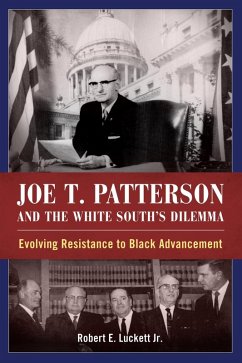
The Limits of Loyalty (eBook, ePUB)
Ordinary People in Civil War Mississippi
Versandkostenfrei!
Sofort per Download lieferbar
16,95 €
inkl. MwSt.
Weitere Ausgaben:

PAYBACK Punkte
8 °P sammeln!
Jarret Ruminski examines ordinary lives in Confederate-controlled Mississippi to show how military occupation and the ravages of war tested the meaning of loyalty during America's greatest rift. The extent of southern loyalty to the Confederate States of America has remained a subject of historical contention that has resulted in two conflicting conclusions: one, southern patriotism was either strong enough to carry the Confederacy to the brink of victory, or two, it was so weak that the Confederacy was doomed to crumble from internal discord. Mississippi, the home state of Confederate Preside...
Jarret Ruminski examines ordinary lives in Confederate-controlled Mississippi to show how military occupation and the ravages of war tested the meaning of loyalty during America's greatest rift. The extent of southern loyalty to the Confederate States of America has remained a subject of historical contention that has resulted in two conflicting conclusions: one, southern patriotism was either strong enough to carry the Confederacy to the brink of victory, or two, it was so weak that the Confederacy was doomed to crumble from internal discord. Mississippi, the home state of Confederate President Jefferson Davis, should have been a hotbed of Confederate patriotism. The reality was much more complicated.
Ruminski breaks the weak/strong loyalty impasse by looking at how people from different backgrounds--women and men, white and black, enslaved and free, rich and poor--negotiated the shifting contours of loyalty in a state where Union occupation turned everyday activities into potential tests of patriotism. While the Confederate government demanded total national loyalty from its citizenry, this study focuses on wartime activities such as swearing the Union oath, illegally trading with the Union army, and deserting from the Confederate army to show how Mississippians acted on multiple loyalties to self, family, and nation. Ruminski also probes the relationship between race and loyalty to indicate how an internal war between slaves and slaveholders defined Mississippi's social development well into the twentieth century.
Ruminski breaks the weak/strong loyalty impasse by looking at how people from different backgrounds--women and men, white and black, enslaved and free, rich and poor--negotiated the shifting contours of loyalty in a state where Union occupation turned everyday activities into potential tests of patriotism. While the Confederate government demanded total national loyalty from its citizenry, this study focuses on wartime activities such as swearing the Union oath, illegally trading with the Union army, and deserting from the Confederate army to show how Mississippians acted on multiple loyalties to self, family, and nation. Ruminski also probes the relationship between race and loyalty to indicate how an internal war between slaves and slaveholders defined Mississippi's social development well into the twentieth century.
Dieser Download kann aus rechtlichen Gründen nur mit Rechnungsadresse in A, D ausgeliefert werden.













